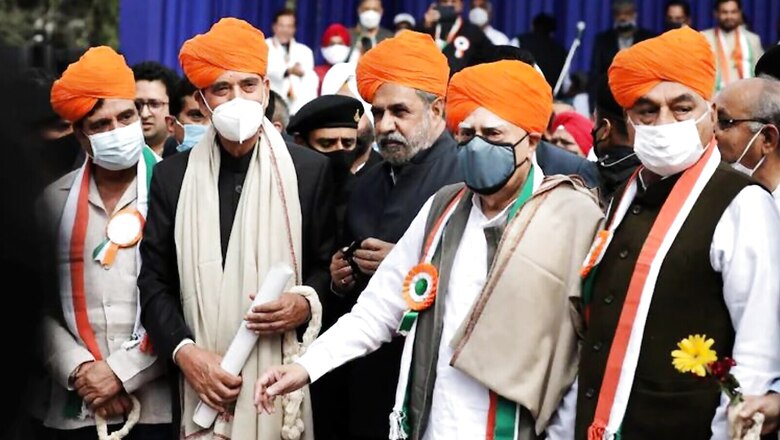
views
It was a bolt out of the blue for the Gandhis when 23 senior Congress leaders — including five former chief ministers, many former Union ministers and sitting MPs — sent Sonia Gandhi a damning letter calling for a complete overhaul of the organization, starting with elections for the party president. This was in August of 2020 and exactly two years since, Congress veteran Ghulam Nabi Azad has quit, leaving behind an even more damning indictment of Rahul Gandhi’s leadership style at a time when the grand old party needs a strong hand at the wheel.
Azad’s resignation is the result of two years of push-and-pull between the grouping, which came to be known as the Group of 23 or G23, and the Gandhi family loyalists. The rumblings of the former gained and lost steam after successive electoral setbacks and the latter resorted to defensive statements while doing little to address the concerns.
The resignation of the J&K leader comes just when the party has launched its election schedule without a clear contender for party president. The reluctance of Rahul Gandhi to take the reins again has fanned criticism that the Wayanad MP wants to be the electoral face of the party without the responsibilities of party president.
As the Congress grapples with yet another exit by a G23 member, News18 profiles the bloc and its impact on the Congress.
Who Makes Up G23
What made the Group of 23 a force to reckon with is the collective experience of party veterans in it and their long-time association with the Gandhi family. Some of the leaders enjoyed close ties with the Congress’ first family since the days of Indira Gandhi and Rajiv Gandhi, and played significant roles in the party’s 2004 and 2009 victories under Sonia Gandhi. They now feel sidelined and elbowed out by a new inner circle curated by Rahul Gandhi and Priyanka Gandhi Vadra.
Then Leader of Opposition in Rajya Sabha
- When the G23 first wrote to Sonia Gandhi, the list of signatories was headlined by Ghulam Nabi Azad, then Leader of Opposition in the Upper House. A constant fixture in the party’s decision-making process since the tumultuous times of Emergency, Azad was a trusted confidante of Sonia Gandhi right from the time of Sitaram Kesri’s unceremonious exit as the Congress chief in 2000.
- He was her troubleshooter — be it a crisis in a faction-ridden state unit like Haryana or cobble up a new alliance and government in Karnataka with the JDS.
- But things were never the same between Azad and Gandhi after the summer of 2020 when he headed the G23. Observers say the relationship broke irretrievably after the interim Congress chief denied Azad a renomination to the Rajya Sabha last year.
Former Chief Ministers
- Apart from Azad, who served as J&K chief minister from November 2005 to July 2008, the signatories included four former CMs. M Veerappa Moily, Karnataka CM in 1992, had signed the first G23 letter to Sonia Gandhi but eventually distanced himself from the group and said his intention was never to target the top leadership of the party. In March this year, Moily pitched for interim Congress chief Sonia Gandhi to take “full control” of the party with a free hand to change non-performing leaders, and asserted that a “mere culture of tweets and social media propaganda” would not take the organisation forward.
- Bhupinder Singh Hooda, now Leader of Opposition in Haryana Assembly, was the state’s CM twice between 2005 and 2014. Reacting to the resignation of fellow G23 member Azad, Hooda said the decision was “unfortunate”. “It is unfortunate, that is what I can say… He (Azad) has been a Congressman throughout,” the former CM said, adding that the exit is bound to have an impact on the party.
- Prithviraj Chavan became the chief minister of Maharashtra in 2010 at the insistence of Sonia Gandhi, succeeding Ashok Chavan. He resigned from the post after the ruling NCP-Congress alliance split in 2014. Chavan had recently claimed that he hasn’t met Rahul Gandhi in four years and on Friday said the party shouldn’t have a “puppet president”.
- Rajinder Kaur Bhattal was the chief minister of Punjab in 1996, and the first and so far only woman to hold the office. In January 2004, she became the deputy chief minister of the state.
Prominent Lawyers
- The original members of G23 also include high-profile lawyers who have provide legal representation to the Gandhi family in crucial cases. Most notable among them is Kapil Sibal who quit the party in May this year and was elected unopposed to the Rajya Sabha as an Independent with Samajwadi party backing. Sibal, who has been vocal in his criticism of the Congress leadership, had called for a non-Gandhi as the new party chief.
- Manish Tewari, former Union Minister for Information and Broadcasting and senior advocate by profession, has shared icy cold vibes with the Congress leadership in recent months. He has not addressed any party press conference of late, with sources saying his public support for the Narendra Modi government’s Agnipath scheme has made it difficult for the party to ‘accept’ him completely.
- Rajya Sabha MP Vivek Tankha is a senior advocate in the Supreme Court and had played a major role in resolving disputes between Madhya Pradesh and Chhattisgarh. Tankha was one of the G23 signatories but seemed to have stepped back from his position. In June this year, the MP went on to say that without the Gandhis, the “party will disintegrate to such an extent that it will become difficult to save its existence”. He had, however, added that the Congress will choose its leader when organisational polls are held in September.
Former Union Ministers
- Former Union Commerce minister Anand Sharma resigned from the chairmanship of the party’s steering committee for Himachal Pradesh last week in a big jolt to the leadership. Sharma, in a letter to Sonia Gandhi, is learnt to have said he was not consulted on the planning for the Assembly elections and cited several examples where he was not even invited for discussions. Sharma, who is also a Congress Working Committee member, on Friday said the G23 “is working to make the Congress stronger”.
- Former MoS for HRD and External Affairs Shashi Tharoor has dubbed the so-called G23 a “media creation”, saying the letter to Sonia Gandhi would have been signed by more leaders but only 23 were available due to the Covid-19 lockdown. “I signed it because there was nothing exceptional… The letter says Congress should democratise itself more, we should revive the parliamentary board of the party, we should have elections to the elected seats of the working committee which are currently filled by nomination, we should revive the party at the grassroots,” Tharoor had said in December 2021.
- Former MoS for HRD, highways and petroleum, Jitin Prasada was among the first G23 members to quit the Congress. Prasada resigned in June 2021 and joined the BJP, becoming a minister in the Yogi Adityanath cabinet in Assembly elections a year later. The UP Public Works Department handled by him is under cloud over allegations of corruption in transfer postings 13 months after the leader took charge of the department.
- Milind Deora, former MoS for I&B and Shipping, had resigned as Mumbai Congress chief following the party’s loss in 2019 Lok Sabha elections. He is currently the party’s observer for upcoming Gujarat elections. Commenting on the collapse of the Congress-Shiv Sena-NCP government in Maharashtra, Deora had recently remarked that many in the party did not see the Sena as a “reliable partner”. It was widely speculated in 2020 that Deora would follow Jyotiraditya Scindia into the BJP.
- Renuka Chowdhury served as the Women and Child Development minister from 2006 to 2009. Chowdhury courted controversy recently when she grabbed the collar of a police official during a protest in Hyderabad against the ED questioning of Sonia Gandhi in the National Herald case.
- PJ Kurien’s presence in the G23 had come as a big surprise to even Congress insiders. Kurien, 80, is former Rajya Sabha deputy chairman, six-term Lok Sabha MP and two-term Rajya Sabha MP. In April this year, Kurien clarified that he did not question Rahul Gandhi’s stability and added that the G23 would welcome Rahul as the Congress chief if he wants to take the mantle or will accept “anyone else with the calibre to lead the party” even if he or she was not from the Gandhi family.
Other Top Brass
Other top leaders in the original G23 included senior leader Sandeep Dikshit, AICC general secretary Mukul Wasnik, former UP Congress chief Raj Babbar, former Delhi Congress chief Arvinder Singh Lovely, former Himachal Pradesh Congress chief Kaul Singh Thakur, then Bihar campaign chief Akhilesh Prasad Singh, former Haryana Speaker Kuldeep Sharma, former Delhi Speaker Yoganand Shastri and former Leader of Opposition in Madhya Pradesh Assembly Ajay Singh.
Changes in the G23
While Ghulam Nabi Azad, Kapil Sibal, Jitin Prasada and Yoganand Shastri have left the Congress, the G23 could count more names as members. In March this year, a meeting of the bloc counted more visitors than expected at Azad’s residence.
Held days after the party’s rout in five Assembly elections, the meeting apart from the original G23 members was also attended by former Union minister Mani Shankar Aiyar and Patiala MP Preneet Kaur, wife of Amarinder Singh who quit the party after being replaced as Punjab CM.
G23 Demands
The G23 has been calling for sweeping changes in the Congress organisation, demanding full time and effective leadership, visible and active in the field, elections to the Congress Working Committee (CWC) and an “institutional leadership mechanism” aimed at the party’s revival.
In his resignation letter, Ghulam Nabi Azad echoed concerns of other G23 members saying “all senior and experienced leaders were sidelined and new coterie of inexperienced sycophants started running the affairs of the party”.
“Unfortunately, after the entry of Shri Rahul Gandhi into politics and particularly after January, 2013, when he was appointed as Vice President by you (Sonia Gandhi), the entire consultative mechanism that existed earlier was demolished by him… All senior and experienced leaders were sidelined, and a new coterie of inexperienced sycophants started running the affairs of the party.”
“One of the most glaring examples of this immaturity was the tearing up of a government ordinance in the full glare of the media by Shri Rahul Gandhi… This one single action, more than anything else, contributed significantly to the defeat of the UPA government in 2014.”
“The only crime committed by the 23 senior leaders who wrote that letter out of concern for the party is that they pointed out both the reasons for the weaknesses in the party and the remedies thereof. Unfortunately, instead of taking those views on board in a constructive and cooperative manner, we were abused, humiliated, insulted, and vilified in a specially summoned meeting of the extended CWC meeting,” Azad wrote.
What Next for G23
Ghulam Nabi Azad’s resignation marks the most high-profile exit from the G23. The G23 has virtually disintegrated over the last two years with the resignations of Azad and Kapil Sibal, seen as the prime movers of the initiative, and others such as Shashi Tharoor, M Veerappa Moily and Mukul Wasnik making peace with the high-command.
While Tankha has been rehabilitated and sent to the Rajya Sabha from Madhya Pradesh in June, Deora and Tharoor have been given party responsibilities in Maharashtra for the “Bharat Jodo Yatra”. Hooda, who is unwilling to cede political space within the Congress in his stronghold of Haryana, recently succeeded in ensuring the appointment of his loyalist Udai Bhan as the party’s state unit president.
Wasnik, who did not show much interest in the G-23 activities after their letter to Gandhi became public, was made a member of the Congress Task Force-2024 and later, given a Rajya Sabha berth.
Dikshit, the son of former Delhi chief minister Shiela Dikshit, made a sharp riposte to Azad’s resignation letter, reminding the veteran leader that the G-23 move was a “banner of reform, not a banner of revolt”.
While Azad’s exit is certainly a blow to the Congress, it takes the sting away from the G23. The next move of what’s left of the G23 will be closely watched after internal elections give the party a new president.
Read all the Latest Explainers News and Breaking News here

















Comments
0 comment